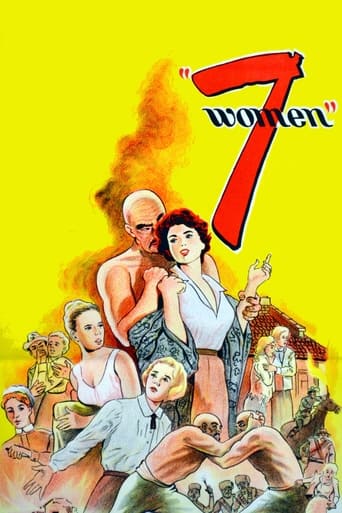JasparLamarCrabb
John Ford's final film is a real curiosity. Anne Bancroft plays a butch doctor sent to work at a mission in China and ruffles the feathers of most of the missions, especially Margaret Leighton.7 WOMEN is very studio bound and has a real half-hearted feel to it. Bancroft, a last minute replacement for Patricia Neal, is actually TOO strong and her character is really unappealing. Leighton is shrewish and the other women in the classy cast including Flora Robson, Mildred Dunnock and Sue Lyon barely register. And why is 53 year old Betty Field playing a pregnant woman? Her husband is the equally aged Eddie Albert. Mike Mazurki offers a cartoon character version of a savage who invades the mission and puts the disruptive Bancroft in her place. Ford may have viewed himself as a man of the Indians, but he really had no clue of how to handle women!
stevehulett
"Seven Women" is the last feature film of John Ford, arguably the greatest director the United States has yet produced. After a half century of film making, Ford ended his fabled career with a wide screen feature about women in peril at a Chinese mission. Infirm and alcoholic, he filmed it on an MGM sound stage; MGM then cut it and tossed it away on the bottom half of a double bill.Today, the film is little known and seldom seen. It is far from Ford's best work, yet there is power and believability in many of the lead performances, and power in the arc of the story. Anne Bancroft shines as a feisty New York doctor who ultimately sacrifices herself to save the other missionaries -- many whom she doesn't agree with -- from brutal deaths at the hands of Chinese bandits. Her work here is more forceful and better realized than her role of Mrs. Robinson, done two years later.The best gift MGM/Sony could give lovers of serious cinema is a clean print of this forgotten film. Its sets are often glaringly artificial, and some of the secondary players are over the top (an old weakness of Ford's) as well as miscast, but "7W" is a far better film than Hollywood legend has told us.
zetes
John Ford's swan song is very underrated. Anne Bancroft plays a chain-smoking doctor who has fled the United States (for reasons unknown, unless they were explained during the minute or so I was away to answer the phone) to work at a mission in China. Margaret Leighton plays the head of this mission, a devout Christian who controls her underlings with strict rules. Various troubles ensue, the most prominent being the threat of a cholera epidemic, a raid by Mongolian bandits, and a pregnant woman who is nearing menopause, which makes the birth a very difficult situation. It is the second problem which I mention that takes up most of the plot. The mission has heard stories of these Mongolians in the nearby areas. Leighton is sure that they will never dare attack her mission, by the grace of God and America. But they do, and they keep all the white women hostage after killing off every Chinese person in sight. They believe that they can win a ransom for them. The tough Bancroft bravely opposes them, but she can make no headway by those means. Instead, the leader of the bandits demands sex. In this way, she is able to influence the way the women are treated (especially concerning the birth). The main conflict of the film is between Leighton and Bancroft. It's very 60s, with the progressive, liberated woman fighting against the strict, sexless one. The role of religion is very interesting in the film. It's shocking that Ford, a devout Catholic, would make the headmistress so foolish. It's a very intelligent criticism of the holier-than-thou attitude of some. When death looks imminent, Leighton seems almost excited to become a martyr; and she's willing and ready to take everyone else with her. When Bancroft sees her chance to save the others, Leighton viciously attacks her for being the "whore of Babylon." The final scene is quite excellent. What a great way for the greatest director of all time end his career.
mike-544
John Ford, usually with the reputation of misogynist, directed his last film surrounded by strong female characters and where the male characters are not particularly relevant. The movie is set in China, 1935, where a Civil War is taking place. Anne Bancroft, a female doctor who is also an atheist, says: "I spent years in slum hospitals. I never saw God come down and take care of anyone". Ford, with his catholic roots, allows himself to be pessimistic. Even when Margaret Leighton, a supposed strong believer is confronted by the female doctor, she says: "I've always searched for something that... isn't there. And God is not enough. God help me - He isn't enough".The title refers to seven women, but the fact is that there are eight: What led us to believe that Anne Bancroft is excluded from the beginning? She wears man's clothes, she smokes and drinks. The loner Bancroft, condemned to always walk alone, like Ethan Edwards in "The Searchers". And what about the final scene, with a rare beauty, where the viewer isn't allowed to watch her fall? She is dressed in woman's clothes for the first time and is prepared to a truly catholic gesture, the sacrifice. "Seven Women" is a beautiful film, almost perfect. Towards the end, we become aware that Mr. Ford will live eternally.



